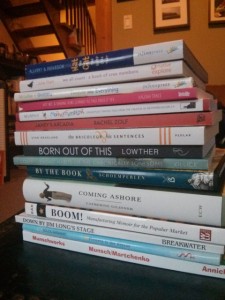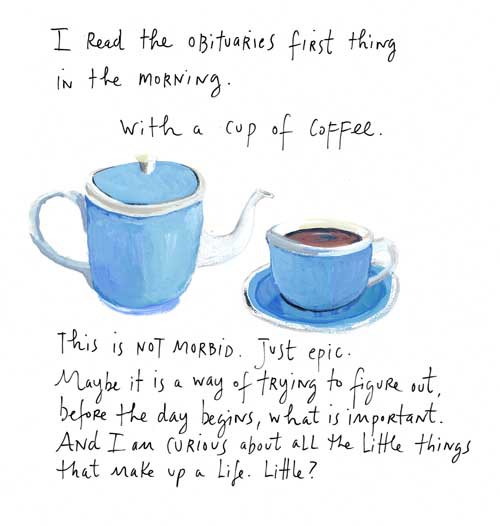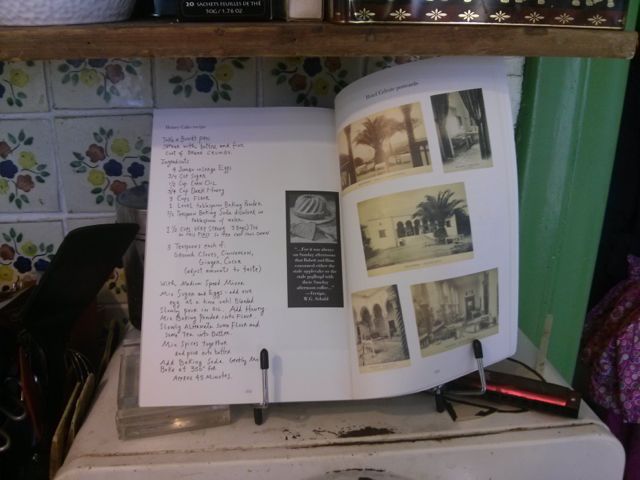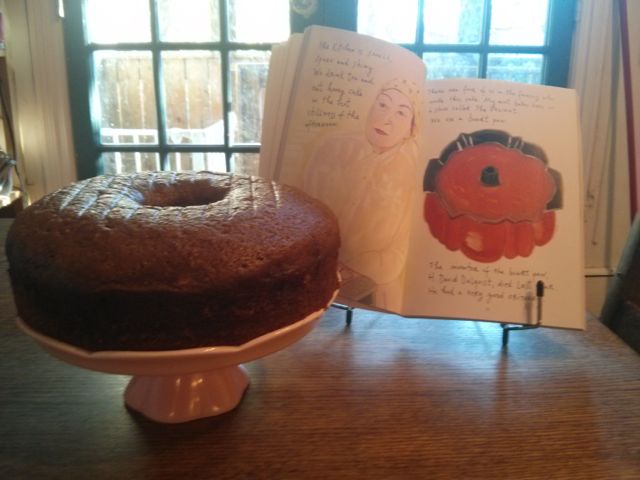November 16, 2014
Inspire
I didn’t know I needed a book fair. Truthfully, my taste for book events are limited because books are my whole life already, and when I go out, it only means less time to read them, and then yesterday I took the escalator up arriving at the Toronto International Book Fair, and I was instantly converted.
It was wonderful.
 It was like 49th Shelf, but in real life. Our site, with it’s nearly 80,000 title listings, as I explained to passers-by today as they visited the 49th Shelf booth. These Canadian titles with their beautiful covers, and it’s my job to select which ones to feature on our main page every week, which to include on our lists. So many books, and I know the people who make them, publishers across the country whose good work makes my work so much easier and such a pleasure.
It was like 49th Shelf, but in real life. Our site, with it’s nearly 80,000 title listings, as I explained to passers-by today as they visited the 49th Shelf booth. These Canadian titles with their beautiful covers, and it’s my job to select which ones to feature on our main page every week, which to include on our lists. So many books, and I know the people who make them, publishers across the country whose good work makes my work so much easier and such a pleasure.
And all of a sudden, here the books were, with covers I know so well, but have never touched. My favourite parts of the fair included the Discovery Pavilion, with Ontario Presses like Biblioasis, Coach House, Mansfield Press, Second Story…so many more. Nearby was Breakwater Books, all the way from Newfoundland. And also the booth for All Lit Up, featuring books by independent Canadian publishers. Books by First Nations authors, a display of art by Canadian illustrators, and then I turn a corner and there’s Gordon Korman. Random House and Simon and Schuster had great booths too, and it was so much fun. So many books. I was in book heaven.
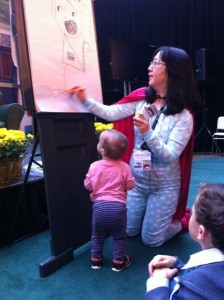 I had the most wonderful time yesterday, and left disbelieving that I’d really get to do it all again tomorrow. The fair was oh so good that I brought my kids and family this morning, quite sure that they’d enjoy the kids’ programming in store, and they did, as you can see in this photo of Iris helping out Debbie Ridpath Ohi with her presentation. The fair was well attended but not hugely so, this being the first year, which meant that we could browse without being crowded, and there was room enough for everyone, and room enough even for children to run amuck. It was an excellent atmosphere, and hugely cool presentations—we caught part of Jon Klassen today. I had the pleasure of introducing Catherine Gildiner yesterday, and there were also appearances by Anne Rice and Margaret Atwood, and so so many others. Truly something for everyone.
I had the most wonderful time yesterday, and left disbelieving that I’d really get to do it all again tomorrow. The fair was oh so good that I brought my kids and family this morning, quite sure that they’d enjoy the kids’ programming in store, and they did, as you can see in this photo of Iris helping out Debbie Ridpath Ohi with her presentation. The fair was well attended but not hugely so, this being the first year, which meant that we could browse without being crowded, and there was room enough for everyone, and room enough even for children to run amuck. It was an excellent atmosphere, and hugely cool presentations—we caught part of Jon Klassen today. I had the pleasure of introducing Catherine Gildiner yesterday, and there were also appearances by Anne Rice and Margaret Atwood, and so so many others. Truly something for everyone.
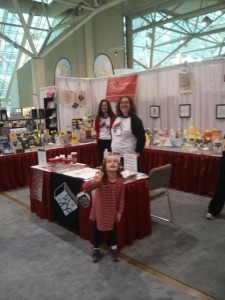 And then there were the books I bought. I couldn’t quit. Believe it or not, I’d intended to buy nothing. Because do I need books? I do not. But then I was there, and it was so good, and such a joy to see so many wonderful publishers being celebrated, to celebrate them myself. By buying their books, of course. The books I know from 49th Shelf, some of which are a little bit mythical, but there they were, and I had to have them. I bought Hot Wet and Shaking: How I Learned to Talk About Sex by Kaleigh Trace, because Harriet picked out the cover (and I have heard many good things about this book). Eating Habits of the Chronically Lonesome by Megan Gail Coles, because I’d featured it on our main page last week and everybody I saw today was walking around with a copy. Diane Schoemperlen‘s because it was reviewed in the newspaper yesterday. Catherine Gildiner’s Coming Ashore, because her presentation was oh so funny. And others still, just because because because. I had to leave finally because my book bag was stuffed and it was getting ridiculous.
And then there were the books I bought. I couldn’t quit. Believe it or not, I’d intended to buy nothing. Because do I need books? I do not. But then I was there, and it was so good, and such a joy to see so many wonderful publishers being celebrated, to celebrate them myself. By buying their books, of course. The books I know from 49th Shelf, some of which are a little bit mythical, but there they were, and I had to have them. I bought Hot Wet and Shaking: How I Learned to Talk About Sex by Kaleigh Trace, because Harriet picked out the cover (and I have heard many good things about this book). Eating Habits of the Chronically Lonesome by Megan Gail Coles, because I’d featured it on our main page last week and everybody I saw today was walking around with a copy. Diane Schoemperlen‘s because it was reviewed in the newspaper yesterday. Catherine Gildiner’s Coming Ashore, because her presentation was oh so funny. And others still, just because because because. I had to leave finally because my book bag was stuffed and it was getting ridiculous.
(“You know, you don’t have to single-handed keep Canadian publishing afloat,” said my husband. Yes, but…)
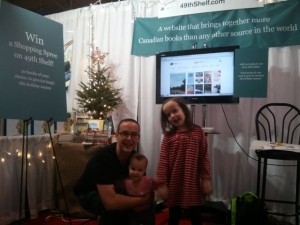 So what fun, revelling in bookish things, meeting and re-meeting book people—my people. How rare in this day and age to have an event in the publishing industry so big and forward-looking and optimistic. A party instead of a funeral. The world as a bookstore. It was refreshing and so much fun to be celebrating reading, and readers, and writers and books (and booksellers too!). There was nothing tired about it, and being there was such a pleasure.
So what fun, revelling in bookish things, meeting and re-meeting book people—my people. How rare in this day and age to have an event in the publishing industry so big and forward-looking and optimistic. A party instead of a funeral. The world as a bookstore. It was refreshing and so much fun to be celebrating reading, and readers, and writers and books (and booksellers too!). There was nothing tired about it, and being there was such a pleasure.
I’m a bit sorry that we can’t do it all again tomorrow again, but I’m excited to do it again next year.
November 10, 2014
Commemoration serves a political agenda
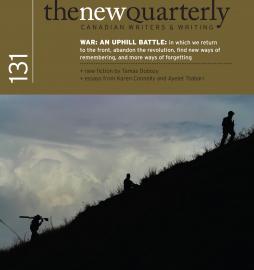 “Commemoration serves a political agenda, where nations adopt a single story that comes to represent past wars, constructed to uphold a version of the story that allows a nation to maintain a positive perception of its past. In the absence of multiple voices all speaking their own stories, nuance and contradiction are subsumed under an authoritative narrative.” –Carol Acton, “Lest We Forget: War and Memory in the 21st Century” , TNQ 131
“Commemoration serves a political agenda, where nations adopt a single story that comes to represent past wars, constructed to uphold a version of the story that allows a nation to maintain a positive perception of its past. In the absence of multiple voices all speaking their own stories, nuance and contradiction are subsumed under an authoritative narrative.” –Carol Acton, “Lest We Forget: War and Memory in the 21st Century” , TNQ 131
I renewed my subscription to The New Quarterly in July, but something went amiss (in particular: my ability to follow up on things) and so only just today did I receive my copy of TNQ 131 whose theme is “War: An Uphill Battle.” But I’m glad about that, because I think I’ve been looking for this exact read as we head into another Remembrance Day, a day that overwhelms me because I think about it oh so much. Though you mightn’t think so—I don’t wear a poppy. But not for thoughtlessness, no. Rather, I am so uncomfortable with the authoritative narrative, which seems to have become even more heightened since a mentally-ill man with a gun charged through Ottawa last month and murdered another man who was a soldier. Some might explain this as the soldier having given his life for us, which doesn’t make any sense. I am also so troubled by how war devastates soldiers’ mental and physical health—it’s as bad for them as it is for anyone. I learned about war from my grandfathers, who were both quite adamant that there should never be another one, that no human being should have to go through that. And they knew what they were talking about.
I’ve only just started reading TNQ, but am already finding it enthralling—in particular Ayelet Tsabari’s essays about her experiences in the Israeli army and growing up under the threat of war, how those experiences formed the person she’d become. A piece by journalist May Jeong about her experiences reporting from Afghanistan. (She writes, “If we are serious about bringing women’s rights to the this country, we have to end the war first.”) Stories and reflections on war and conflict, by writers including Kevin Hardcastle and Tamas Dobozy. The essay, “Mud” by the brilliant Rachel Leibowitz. “Look, Don’t Look” by Diana Fitzgerald-Bryden, on what violent and graphic images do to those of us who watch them. And Karen Connelly’s “#ItEndsHere” on the war(s) on women, along with poems from her latest book, Come Cold River. So many voices, so much nuance and contradiction. It’s a really stunning issue. I’m glad to have finally received it.
So what to do then when you’re a person who won’t wear a poppy, but who wants your daughters to remember the brutal, thankless war their great-grandfathers fought, and one before it in which their great-great-grandfather died. When you’re allergic to sentiment and glorification, you think that death doesn’t make one a hero and also that all this death and injury is such a waste, and you understand the ramifications of Canada having abandoned its role as a peacekeeper. Well, instead of a moment of silence, we talk and talk, and ask questions, and point out contradictions, and reflect, and we read, and we learn.
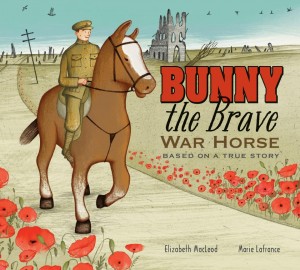 I am very pleased with the new picture book, Bunny the Brave War Horse, by Elizabeth MacLeod and Marie Lafrance, which doesn’t glorify war at all or mask its ugliness, but won’t terrify young readers either. When a soldier dies in the book, no one suggests it was worth it. But the story keeps the memory of WW1 alive, and we can strengthen the connection by pointing out that that it was really not so long ago. There is nuance here, the soldier thinking to himself that the battlefield (with its poppies) must have been a beautiful place before it was wracked and scarred by war.
I am very pleased with the new picture book, Bunny the Brave War Horse, by Elizabeth MacLeod and Marie Lafrance, which doesn’t glorify war at all or mask its ugliness, but won’t terrify young readers either. When a soldier dies in the book, no one suggests it was worth it. But the story keeps the memory of WW1 alive, and we can strengthen the connection by pointing out that that it was really not so long ago. There is nuance here, the soldier thinking to himself that the battlefield (with its poppies) must have been a beautiful place before it was wracked and scarred by war.
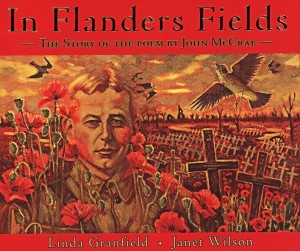 I also appreciate the book In Flanders Fields by Linda Granfield, which was first published in 1995 and has just been reissued. Harriet is too young for all the biographical details about John McRae and his poem, but we read the poem itself last night, accompanied by the stirring illustrations, and it made me cry. (It is possible that I so allergic to sentiment because I am particularly susceptible to it.) Yes, it’s definitely part of that authoritative narrative, which would suggest that I have indeed broken faith with those who died, but I haven’t, and neither do I wish current Canadian forces troops anything but “support”, whatever that means. Except what it means has been hijacked, and it’s all very hard, and awful and (really) unnecessary. It is.
I also appreciate the book In Flanders Fields by Linda Granfield, which was first published in 1995 and has just been reissued. Harriet is too young for all the biographical details about John McRae and his poem, but we read the poem itself last night, accompanied by the stirring illustrations, and it made me cry. (It is possible that I so allergic to sentiment because I am particularly susceptible to it.) Yes, it’s definitely part of that authoritative narrative, which would suggest that I have indeed broken faith with those who died, but I haven’t, and neither do I wish current Canadian forces troops anything but “support”, whatever that means. Except what it means has been hijacked, and it’s all very hard, and awful and (really) unnecessary. It is.
An uphill battle, indeed.
However one remembers, though, the point is just not to forget, and I haven’t. I won’t.
November 2, 2014
On Uncertainty, Mistakes, and Accidental Cake
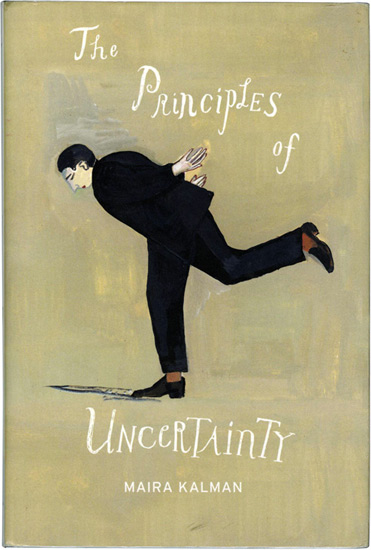 Tomorrow night in my blogging course, we will be discussing Rebecca Solnit’s essay, “Woolf’s Darkness: Embracing the Inexplicable”, which really might be one of my favourite pieces of writing ever, and whose wisdom is remarkably applicable to blogging, as well as to life itself. “To me, the grounds for hope are simply that we don’t know what will happen next, and that the unlikely and the unimaginable transpire quite regularly.”
Tomorrow night in my blogging course, we will be discussing Rebecca Solnit’s essay, “Woolf’s Darkness: Embracing the Inexplicable”, which really might be one of my favourite pieces of writing ever, and whose wisdom is remarkably applicable to blogging, as well as to life itself. “To me, the grounds for hope are simply that we don’t know what will happen next, and that the unlikely and the unimaginable transpire quite regularly.”
So I’ve been rereading the essay, following its twists and turns (and thinking about how much the public streets walked by Woolf’s narrator in “Street Haunting” can stand in for the blogosphere, “a form of society that doesn’t enforce identity but liberates it, the society of strangers, the republic of the streets, the experience of being anonymous and free that big cities invented”).
And then there was an excursion to Kensington Market to purchase not a pencil, but boots for the grown-ups in our family, because the shop there that caters to Portuguese construction workers is the best place we know to buy new Sorels. This was yesterday, and we’d woken up to flurries, so it seemed essential that we buy boots immediately. Plus while in the market, we’d get to pick up wood-smoked bagels and sausages from Sanagans for our evening meal. Once the boots were bought, Stuart with stroller was sent on the bagel errand, while Harriet and I took a quick diversion into Good Egg to scope out potential birthday presents for him.
Where I found this book, Maira Kalman’s The Principles of Uncertainty, based on her illustrated New York Times column. I’d never read the column, but I had been reading Solnit’s essay, which references Kalman’s work, her art, this book. And here was the book in my hands, so I had to have it. I came out of the shop with a stack of books, but pleased with myself. “Only one of these is for me.”
When I got home and went through the Solnit essay again, however, I found that I’d been mistaken. While a section of “Woolf’s Darkness” indeed shares a title with Kalman’s book, Solnit doesn’t mention Kalman at all. I’d made the whole thing up. I’d bought the book by accident. Which was kind of interesting to me, because I am so interested in the connections between books, how they speak to one another, and now I’m fascinated too by the idea of the mistaken allusion, the connection that was never there at all. But now it is, because I supposed it was. Our reading lives are such a tangled web.
All was not lost though. While Kalman’s book was far from Solnit’s essay (though for me, the two shall be linked forevermore—and they’re actually interesting companions), the book was wonderful. It was as though my mistaken allusion had been a trick to get The Principles of Uncertainty into my hands, where it had belonged all the while.
Full of gorgeous images, funny stories, curious questions, and delightful things. It has an index, as all the best books do, and an appendix with images of postcard collections (one of postcards with waterfalls), collected food packets, a list of all the characters in The Idiot by Dostoevsky, and the family recipe for the honey cake referenced on page 54:
“The kitchen is small, spare and shiny. We drink tea an eat honey cake in the hot stillness of the afternoon.”
This afternoon, I baked that cake with Harriet, because today had an extra hour within and there was space for such a thing. We had to borrow a bundt pan from our neighbour, Sarit, because we don’t have a bundt pan even though I thought we did. It seems there is no limit to what I’m capable of remembering wrong.
We had a good time baking—it is much less frustrating baking with Harriet now than when she was three and compelled to stick her hands in the batter (and she sneezes in the bowl hardly ever now). I explained to her that we were making a cake from the book that I had bought by mistake, and it’s that a wonderful thing about the universe—that an accidental book can lead to cake in the oven on a sunny afternoon:
“And then the all-clear sounded and people returned, hope undiminished. They returned, so elegant and purposeful to the books. / What does this have to do with bobby pins and radiators and kokoshniks? One thing leads to another.”
Then when we were all done, I proceeded to TWICE pick up the bundt pan (which was constructed of two parts) incorrectly, separating the bottom from the sides and batter seeping out onto the table. (“I heard at least two ‘fucks,'” Stuart inquired after. “What went wrong?”) As I spatula’d up the mess, Harriet patiently parroted what I’d been saying to her about the accidental book as we’d baked, that sometimes mistakes lead us in the most interesting directions.
“I don’t know if it’s quite the same with baking,” I confessed, sorry that everything was not so poetic, but perhaps it is, or it’s just that this cake is forgiving, because it was, and the cake was wonderful. Delicious, moist, and a perfect balance of spice and sweet. One thing leading to another indeed, and what good fortune when the thing one’s being led to is cake.
October 22, 2014
What to Read in Uncertain Times
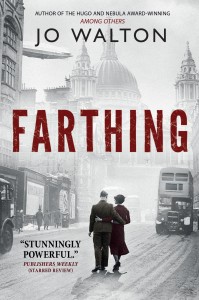 In these uncertain times (though I am unclear about which times were ever certain) with so much fear, hatred and violence in the world, what books should we turn to? Could there possibly be a book into which escape is possible, all the while the experience of reading sharpens our senses in connection to the troubled world around us?
In these uncertain times (though I am unclear about which times were ever certain) with so much fear, hatred and violence in the world, what books should we turn to? Could there possibly be a book into which escape is possible, all the while the experience of reading sharpens our senses in connection to the troubled world around us?
 But in fact there are three, Jo Walton’s “Small Change” series, which begins with Farthing, then Ha’Penny and Half a Crown. We devoured them on our summer vacation this year, detective novels set in an alternate history in which Britain had declared peace which Germany in 1940 and began a slippery slide into Fascism underlined by establishment powers. Such fun absolutely, and yet they’ve never been far from my mind ever since, particularly in light of government response to terror threats in the UK and in Canada lately which has seemed eerily similar to the story Walton writes in her book.
But in fact there are three, Jo Walton’s “Small Change” series, which begins with Farthing, then Ha’Penny and Half a Crown. We devoured them on our summer vacation this year, detective novels set in an alternate history in which Britain had declared peace which Germany in 1940 and began a slippery slide into Fascism underlined by establishment powers. Such fun absolutely, and yet they’ve never been far from my mind ever since, particularly in light of government response to terror threats in the UK and in Canada lately which has seemed eerily similar to the story Walton writes in her book.
Though this similarity is most deliberate. Walton writes:
 “I wrote these books during a dark time politically, when the US and the UK were invading Iraq without a Security Council resolution on a trumped up casus belli. I was brought up by my grandparents, and the defining event of their lives was WWII, it cut across them like a knife. To find a government I had voted for waging a war of aggression really rocked my expectations. If I’d been in Britain I’d have marched and protested, but I was in Canada, which kept out of that unjust war. My husband is Irish, and Ireland wasn’t doing it either. I think it was my isolation on this that went into writing these books.
“I wrote these books during a dark time politically, when the US and the UK were invading Iraq without a Security Council resolution on a trumped up casus belli. I was brought up by my grandparents, and the defining event of their lives was WWII, it cut across them like a knife. To find a government I had voted for waging a war of aggression really rocked my expectations. If I’d been in Britain I’d have marched and protested, but I was in Canada, which kept out of that unjust war. My husband is Irish, and Ireland wasn’t doing it either. I think it was my isolation on this that went into writing these books.
I had read a lot of cosy mysteries, Tey, Sayers, Christie, Heyer, and considered the interesting fact that they were about sudden violent death and yet they were written in a way that made them safe, indeed cosy. I thought I could use this to write about fascism, and not in a closed known historical context where we’re safe and sure of the ending either.”
We live in a good world—this is one thing I am not uncertain about. And while art is so often a mirror or a window through which we understand the world, it’s so essential that sometimes we see it from a different point of view, which Walton does so brilliantly here, reframing history in a way that helps us understand and navigate the uncertainty of right now, and strive to be better than we are.
October 14, 2014
The Bookshop Book by Jen Campbell
 I was always going to love this book. Would have loved it for the cover alone, the colours, the jumbled shelves, even if it weren’t a celebration of bookshops, which are things I like to celebrate better than almost anything else. “Some Wonderful Things” is a collection of bookshop facts appearing every few pages throughout the book, and I adore any mindset that collects under such a designation. Under which the entire book should appear, probably, because it’s that good, a variable delight. The Bookshop Book by Jen Campbell, which asserts that bookshops are here to stay and more excellent than ever, and such a vital part of communities and our reading and writing lives.
I was always going to love this book. Would have loved it for the cover alone, the colours, the jumbled shelves, even if it weren’t a celebration of bookshops, which are things I like to celebrate better than almost anything else. “Some Wonderful Things” is a collection of bookshop facts appearing every few pages throughout the book, and I adore any mindset that collects under such a designation. Under which the entire book should appear, probably, because it’s that good, a variable delight. The Bookshop Book by Jen Campbell, which asserts that bookshops are here to stay and more excellent than ever, and such a vital part of communities and our reading and writing lives.
I dare you to read this book and not start planning trips around the world to the incredible bookshops featured within its pages—I’m already planning a trip to Silverdell Books in Kirkham, Lancashire, which is a bookshop/ice cream parlour; and how have I never been to Munro’s Books in Victoria BC; and a trip to Parnassus Books in Nashville has never been so necessary; and Libreria Acqua Alta in Venice is the most exquisite sight I’ve ever seen. Campbell shares short profiles of bookshops on six continents (because sadly, there’s not one on Antarctica yet). I do appreciate that at least one shop in the book is within walking distance, The Monkey’s Paw here in Toronto getting special treatment, and I want to go back to Re:Reading on the Danforth, in particular since I read that owner Christopher Sheedy rejigged his store’s layout to accommodate families with strollers (so nice!).
More than just a travel guide, The Bookshop Book is a history too, of the history of bookshops in general and the stories of remarkable ones (which is most of them—including a bookshop on a boat, a bookshop without an address, a bookshop that only stocks one book, and many many more). Campbell talks to writers including Tracy Chavalier, Bill Bryson, Ian Rankin and Ali Smith about their bookshop thoughts.
Ali Smith: “If I owned my own bookshop? I remember when I first found a copy of Tove Jansson’s The Summer Book, a slim Penguin from the 1970s—you wouldn’t even notice it on a shelf. My bookshop would be full of those types of things: the books that, when you picked them up, you knew immediately that that was the book you were going to read that day. Moreover: whatever you’d been planning on doing, you’d just sit down with that book you’d picked up by chance and read that instead. The days when we sit down with a books o good we don’t get up until it’s read—those are some of the best days of our lives.”
 The Bookshop Book made me think of my own bookshop stories: marvelling at The World’s Biggest Bookstore as a child, compulsive book buying at Nicholas Hoare the summer I spent the paycheques I should have been saving for university tuition, the Waterstones in Nottingham and having money after a long bout of poverty, Shakespeare and Company in Paris where my husband and I had our very first fight, discovering Margaret Drabble at Wantage Books in Kobe, and when Harriet ate a sandwich she found on the ground under a table at the Waterstones in Edinburgh, The Grove Bookshop in Ilkley, an altogether delightful place. It made me think of the bookshop stories I’m passing onto my own children, the bookshop adventures we go on together, even though the destinations are getting rarer. But bookshops, this book and the voices within it assert, will never disappear altogether.
The Bookshop Book made me think of my own bookshop stories: marvelling at The World’s Biggest Bookstore as a child, compulsive book buying at Nicholas Hoare the summer I spent the paycheques I should have been saving for university tuition, the Waterstones in Nottingham and having money after a long bout of poverty, Shakespeare and Company in Paris where my husband and I had our very first fight, discovering Margaret Drabble at Wantage Books in Kobe, and when Harriet ate a sandwich she found on the ground under a table at the Waterstones in Edinburgh, The Grove Bookshop in Ilkley, an altogether delightful place. It made me think of the bookshop stories I’m passing onto my own children, the bookshop adventures we go on together, even though the destinations are getting rarer. But bookshops, this book and the voices within it assert, will never disappear altogether.
 Unsurprisingly for a book that heralds places in which the book as object is their reason for existing, this book as an object is a most remarkable one. Hardcover, gorgeously designed, with two sections of colour photographs that make clear that these bookshop are as lovely as Campbell says they are. The prose is something else that falls under the category of “some wonderful things” and the whole thing is a delight to encounter, something I first intended just to dip in and out of, but I couldn’t help myself and read the whole thing. You will probably have a similar experience.
Unsurprisingly for a book that heralds places in which the book as object is their reason for existing, this book as an object is a most remarkable one. Hardcover, gorgeously designed, with two sections of colour photographs that make clear that these bookshop are as lovely as Campbell says they are. The prose is something else that falls under the category of “some wonderful things” and the whole thing is a delight to encounter, something I first intended just to dip in and out of, but I couldn’t help myself and read the whole thing. You will probably have a similar experience.
 Want to know something really wonderful though? I’m in it. I’m even in the index (and yes, there is an index. In fact, there are two. Because this is the very bookish of books.) I wrote a small piece about my sadness at losing our beloved Book City last winter, which is included on page 176. And I appreciate that while Book City Annex is gone, my love for that place has been immortalized within The Bookshop Book, a most fitting place for such an ode. Good company too, and it’s an honour to be a part of project like this, celebrating places that are the best places in the world.
Want to know something really wonderful though? I’m in it. I’m even in the index (and yes, there is an index. In fact, there are two. Because this is the very bookish of books.) I wrote a small piece about my sadness at losing our beloved Book City last winter, which is included on page 176. And I appreciate that while Book City Annex is gone, my love for that place has been immortalized within The Bookshop Book, a most fitting place for such an ode. Good company too, and it’s an honour to be a part of project like this, celebrating places that are the best places in the world.
The Bookshop Book is out in the UK now. It’s coming out in Canada in the new year. Make sure you pick up a copy. This is definitely a book you will treasure.
September 23, 2014
Excellent Things
 I have been hearing rumours for some time that Penelope Fitzgerald’s novels were to be issued with covers by my very favourite illustrator in the universe, Julie Morstad, and these rumours seem to have manifested into reality. I am so excited. Each of the covers is so intriguing and delightful, and I may have to end up owning every single one of them. Elsewhere, I adored the essay “Love Song to My Belly” in Brain, Child Magazine by Goldberry Long, who is the best writing teacher I have ever had. And closer to home, I got to see Caitlin Moran at the Toronto Reference Library last night, and she was wonderful, plus everyone I know was there, and I got to pick up a copy of her novel, How to Build a Girl, which I’m reading now and keeps making me guffaw, which makes everyone around me uncomfortable.
I have been hearing rumours for some time that Penelope Fitzgerald’s novels were to be issued with covers by my very favourite illustrator in the universe, Julie Morstad, and these rumours seem to have manifested into reality. I am so excited. Each of the covers is so intriguing and delightful, and I may have to end up owning every single one of them. Elsewhere, I adored the essay “Love Song to My Belly” in Brain, Child Magazine by Goldberry Long, who is the best writing teacher I have ever had. And closer to home, I got to see Caitlin Moran at the Toronto Reference Library last night, and she was wonderful, plus everyone I know was there, and I got to pick up a copy of her novel, How to Build a Girl, which I’m reading now and keeps making me guffaw, which makes everyone around me uncomfortable.
And a strange thing: I spent the weekend rereading the wonderful Chez L’Arab by Mireille Silcoff for a review I’m writing for CNQ. I read it first a month ago, followed by Joan Thomas’s The Opening Sky. And found it odd that both books referenced the same zen koan, “No Water, No Moon.” So that was weird. But it gets even weirder, because upon rereading Silcoff’s collection, I was reminded that a character in the story not only reads the paragraph, but then goes on to encounter it in a podcast shortly after, the koan an uncanny echo in the story just as it was in my own experience. The connections between books and the wider world are so unfathomable.
September 19, 2014
Iris is the solution to everything
 Iris is the solution to everything, namely if your “everything” is getting away with the world’s most paltry book haul from the Victoria College Book Sale (which runs all weekend). And my everything was certainly that very thing this morning, because I have so many books and the bookstore called me yesterday to let me know my order is in, plus the one I bought online yesterday direct from the publisher etc, so I didn’t need any more. So this is all I came away with, which I am quite pleased about, because under most circumstances I have absolutely no restraint.
Iris is the solution to everything, namely if your “everything” is getting away with the world’s most paltry book haul from the Victoria College Book Sale (which runs all weekend). And my everything was certainly that very thing this morning, because I have so many books and the bookstore called me yesterday to let me know my order is in, plus the one I bought online yesterday direct from the publisher etc, so I didn’t need any more. So this is all I came away with, which I am quite pleased about, because under most circumstances I have absolutely no restraint.
I’d come prepared with a cookie and a cinnamon bun, hoping these would keep Iris occupied for a little while, and they did, for about 10 minutes, as she snacked in her stroller. But then she wanted out, which she demonstrated by screaming and screaming, because Iris has recently come into her own as a piercing soprano. I ignored her for a little while, and tried to pretend there was nobody else around. And then finally, I took her out and put her in her carrier, browsing continued, popping a “dumma” (soother) into her mouth, but that peace lasted no more than sixty seconds. Who screams while sucking on a soother? But Iris wanted to go, so I let her, and that was okay, because underneath the book tables were boxes and boxes and more books, and Iris likes things in boxes, and I got to look at a whole bunch more books while she played with a box of Goosebumps paperbacks (hence my excellent picture book selection).
And then I took her upstairs to the fiction, which had no boxes under the tables at all, and she was obsessed with the big old staircase that we’d had to climb to get up there, so every time she was let loose, that was where she headed. A brief diversion was a wastebasket, and I let it go for awhile, but then she started picking things out of that box, so I shut it down. I had to hold her, and she was screaming and screaming. Again, I kept my head down and ignored everybody. Surely, I thought, they’d understand that a mother needs to get her book browsing done. A smart trick was holding Iris upside down, which was funny, so she laughed instead of screamed, but that only goes so far, and it made it hard to look for books. And so she kept on screaming, and I think some people may not have found it so charming, but what is a bookish mother to do, I ask you? Well, give up, which I eventually did, but only because I had no business buying books in the first place.
As I was leaving, a very earnest undergrad came up to me and pointed to Iris, who had since calmed down, because we were no longer looking at books. “Is that the baby that was unhappy?” she asked. Apparently Iris was getting a reputation. “Is she okay?” she asked me. “Well, she’s Iris,” I should have told her, but instead I promised her that she was. Whereupon we met my seven-months-pregnant friend and her two-year-old who’d turned an Old Vic couch into a trampoline. I am not sure the book sale is going to recover from a visit from the likes of us.
September 9, 2014
In Which I Meme: Ten Books….
I don’t meme much. I don’t like memes. I like the internet best when everybody is doing her own thing, but I got tagged twice on Facebook, and I’ve been thinking for awhile about how I don’t know how to answer the question of what are my favourite books. For me, the books all blend together, their connections to each other and to the facts of my life all cumulating to pave the path of my progress. It’s not about the book but about the reading. I love books more than I love any one book. But I also love rereading, and so my list of books that have stayed with me (whatever that means—I think any book that’s any good would do such a thing) or a list of my favourites would be a list of books I’ve read more than once, and will continue to revisit to find out how they change as I do. They’re the books I’ll never get over being over.
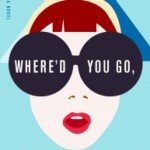 Where’d You Go, Bernadette? by Maria Semple : Partly circumstantial—I read this in the hospital after Iris was born, and had a very visceral connection to everything was reading then, but I just loved it so completely. It was so funny, smart, and fresh, and I’ve been longing for a book to love this completely ever since. Will definitely reread.
Where’d You Go, Bernadette? by Maria Semple : Partly circumstantial—I read this in the hospital after Iris was born, and had a very visceral connection to everything was reading then, but I just loved it so completely. It was so funny, smart, and fresh, and I’ve been longing for a book to love this completely ever since. Will definitely reread.
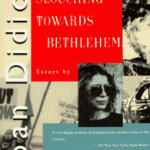 Slouching Toward Bethlehem by Joan Didion: I’ve read this book about six or seven times, and return to it to fall under the spell of the rhythm of Didion’s prose, and to admire the precision with which she arranges details in order of giving her stories the illusion of telling themselves.
Slouching Toward Bethlehem by Joan Didion: I’ve read this book about six or seven times, and return to it to fall under the spell of the rhythm of Didion’s prose, and to admire the precision with which she arranges details in order of giving her stories the illusion of telling themselves.
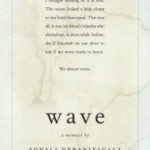 Wave by Sonali Deraniyagala: I was so afraid of this book, my worst nightmare, the story of a woman who loses her entire family in the Boxing Day Tsunami in 2004. I finally obtained a library copy and was bowled over by the brilliance of the book, and so I had to buy my own copy. I haven’t reread it yet but I will. It’s a a heartbreaking tragedy, a litany of sorrows, but also beautiful, magical celebration of love and life.
Wave by Sonali Deraniyagala: I was so afraid of this book, my worst nightmare, the story of a woman who loses her entire family in the Boxing Day Tsunami in 2004. I finally obtained a library copy and was bowled over by the brilliance of the book, and so I had to buy my own copy. I haven’t reread it yet but I will. It’s a a heartbreaking tragedy, a litany of sorrows, but also beautiful, magical celebration of love and life.
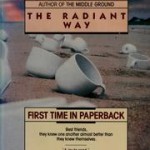 The Radiant Way by Margaret Drabble: This was my first Margaret Drabble novel, which I bought at a used bookshop in Kobe. Had no idea what to expect, but fell in love with its writer, and the book too, for its vividness and how it reflected and engaged with the world.
The Radiant Way by Margaret Drabble: This was my first Margaret Drabble novel, which I bought at a used bookshop in Kobe. Had no idea what to expect, but fell in love with its writer, and the book too, for its vividness and how it reflected and engaged with the world.
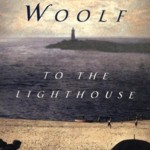 To the Lighthouse by Virginia Woolf: The one book I’ve read more times than Slouching… and it just gets more and more profound and lovely. I read it most recently in July, having replaced my battered and stupidly marginalia’d university copy. It’s the thinking woman’s beach read.
To the Lighthouse by Virginia Woolf: The one book I’ve read more times than Slouching… and it just gets more and more profound and lovely. I read it most recently in July, having replaced my battered and stupidly marginalia’d university copy. It’s the thinking woman’s beach read.
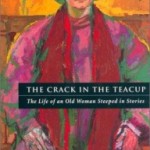 The Crack in the Teacup by Joan Bodger: I’ve read this one twice, and think about it all the time. It’s about being a woman in the 20th century, about loving books, about heartache, about this city. And about the life of an extraordinary woman who was of her time and also never quite, always in a way that was fascinating.
The Crack in the Teacup by Joan Bodger: I’ve read this one twice, and think about it all the time. It’s about being a woman in the 20th century, about loving books, about heartache, about this city. And about the life of an extraordinary woman who was of her time and also never quite, always in a way that was fascinating.
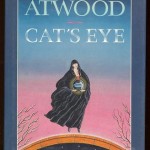 Cat’s Eye by Margaret Atwood: (And also The Robber Bride). Of all the books on my list, I was youngest and stupidest when I first read these, but also so young that they became foundational in my understanding of the lives of girls and women.
Cat’s Eye by Margaret Atwood: (And also The Robber Bride). Of all the books on my list, I was youngest and stupidest when I first read these, but also so young that they became foundational in my understanding of the lives of girls and women.
 We Need to Talk About Kevin by Lionel Shriver: This was one of those books I was never going to read, because I found all the hype at the time annoying, but I came to it somehow, and have read it five times since. I discover a whole new layer of complexity every time, and have determined that it’s just about marriage and womanhood as it is about motherhood. Also worth noting: still a gripping excellent reading when fully aware of its great twist, which is quite a literary feat.
We Need to Talk About Kevin by Lionel Shriver: This was one of those books I was never going to read, because I found all the hype at the time annoying, but I came to it somehow, and have read it five times since. I discover a whole new layer of complexity every time, and have determined that it’s just about marriage and womanhood as it is about motherhood. Also worth noting: still a gripping excellent reading when fully aware of its great twist, which is quite a literary feat.
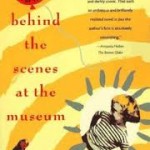 Behind the Scenes at the Museum by Kate Atkinson: I will never forget the moment of Ruby Lennox’s conception, which was also my introduction to the inimitable Kate Atkinson, whose boundless enthusiasm for pushing the limits of what a novel can do makes her one of my favourite authors. Have read this a few times. It contains the seeds of every single wonderful thing she’s written since.
Behind the Scenes at the Museum by Kate Atkinson: I will never forget the moment of Ruby Lennox’s conception, which was also my introduction to the inimitable Kate Atkinson, whose boundless enthusiasm for pushing the limits of what a novel can do makes her one of my favourite authors. Have read this a few times. It contains the seeds of every single wonderful thing she’s written since.
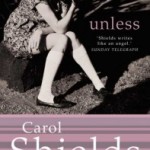 Unless by Carol Shields: I’m a bit of a zealot when it comes to this book, which I’ve read so many times that its pages are covered in scribbles, and whose subtle tricky complexity continues to amaze me.
Unless by Carol Shields: I’m a bit of a zealot when it comes to this book, which I’ve read so many times that its pages are covered in scribbles, and whose subtle tricky complexity continues to amaze me.
*And don’t get me started on the children’s books, Anne of Green Gables, Tom’s Midnight Garden, Charlotte Sometimes, A Handful of Time, Booky, etc. Plus Flowers in the Attic. And so many more…
September 1, 2014
The Vacationers
 Shockingly, it was three whole long weekends ago (July 1!) that I spent a morning in bed drinking tea and reading The Vacationers by Emma Straub, which I enjoyed very much. If I remember correctly, I’d barely slept at all the night before that, thanks to Bad Iris, and this is not one bit shocking. But still, how fast the summer has gone by. I wasn’t sure what I was getting into when I constructed a salad out of marshmallows and Jello back in June, but this summer has been completely wonderful. Even the cool weather didn’t faze us—I sleep in an un-air-conditioned attic, after all. We had a week at our cottage, a long weekend camping, and a weekend away at my parents’, which was fun. We watched an outdoor movie. We finally managed a trip to the Toronto Islands, slipping in under the wire on Saturday. We went to the CNE today. There was plenty of ice cream all summer long, of course. Soccer and bike rides. Harriet was enrolled in two weeks of an afternoon art camp, and one week of full day camp, which made us never tire of the days we spent together. Even with the imperfect weather, we went swimming at the Christie Pits pool, and Harriet has acquired the requisite number of freckles on her nose.
Shockingly, it was three whole long weekends ago (July 1!) that I spent a morning in bed drinking tea and reading The Vacationers by Emma Straub, which I enjoyed very much. If I remember correctly, I’d barely slept at all the night before that, thanks to Bad Iris, and this is not one bit shocking. But still, how fast the summer has gone by. I wasn’t sure what I was getting into when I constructed a salad out of marshmallows and Jello back in June, but this summer has been completely wonderful. Even the cool weather didn’t faze us—I sleep in an un-air-conditioned attic, after all. We had a week at our cottage, a long weekend camping, and a weekend away at my parents’, which was fun. We watched an outdoor movie. We finally managed a trip to the Toronto Islands, slipping in under the wire on Saturday. We went to the CNE today. There was plenty of ice cream all summer long, of course. Soccer and bike rides. Harriet was enrolled in two weeks of an afternoon art camp, and one week of full day camp, which made us never tire of the days we spent together. Even with the imperfect weather, we went swimming at the Christie Pits pool, and Harriet has acquired the requisite number of freckles on her nose.
I feel very lucky to be able to spend the summer with my children. Here is why I really feel lucky though—when Iris goes to sleep in the afternoons, Harriet sits down to watch a movie, and I lie down to write. And I did. At the end of June, I embarked upon a Summer Writing Marathon, which I didn’t have time for, but I never will have time, so why wait? I resolved to write 1000 words a day, and I did it (save for vacations). On Friday, I logged in at 50,000 words. I’m on my way to writing a novel whose first draft will be completed by the end of September. And you might think that this is exciting, except, of course, this is the fifth time I’ve written a novel. But this is a first time I’ve written a novel that might be interesting, and also the first time that the process has been so exhilarating. So this has certainly been a summer highlight.
Harriet spent July watching Frozen, and then took up an obsession with Annie that has yet to abate. She has watched it near daily for the last month, which pleases me immensely, because it’s one of my all-time favourite films. I never get tired of it, and am pleased to have someone to sing all the songs with. She also talks about it incessantly, which has led to me thinking more deeply about Miss Hannigan, for example, than I ever thought I would. I am going to write a post about this one of these days…
Because of my writing marathon, I had to do all my other work in the evenings, which meant I didn’t read this summer as much as I would have liked (except for when we went away, and I read six books in seven days). And what I read, I didn’t write much about. I read Anthony de Sa’s Kicking the Sky, which I liked for its depiction of Toronto and for being not what I expected, but didn’t appreciate as much as I thought I would. I read Jane Rule’s Deserts of the Heart, whose depiction of a lesbian relationship in the 1960s was groundbreaking. I read Life Among the Savages by Shirley Jackson for my book club, which I didn’t love as much I thought I would, but led to such interesting discussion. And I read Letters to Omar by Rachel Wyatt, and we did an interview, which will be up here in a couple of weeks. There were a few others too (all good!), which I read for reviews that will be published elsewhere in the next while.
Harriet doesn’t start school until Thursday, so we have a couple more days of summer left. And I’m going to miss her when she goes, though I’m not going to tell her so, because when I did last year, she cried, so that definitely wasn’t my smoothest move.
August 21, 2014
Family Happiness
 I reread Laurie Colwin last week, the novel, Family Happiness. And I am still thinking about “chicklit” (a term I dislike, because I’d never actually call a human person a “chick”) and how I’ve changed my mind about it. The problem with chicklit, I used to think, was that so much of it was shallow and silly and that important books kept being undermined by being shushed away into that category. I used to agree with authors who’d protest that any book about women and relationships was automatically written off as “chicklit”, and also that it was a travesty how women’s fiction was always pushed to the margins. I wrote an entire essay about this, which referenced the line from Woolf’s A Room of One’s Own: “This is an important book, the critic assumes, because it deals with war. This is an insignificant book because it deals with women in a drawing-room. A scene in a battlefield is more important than a scene in a shop – everywhere and much more subtly the difference of value persists.”
I reread Laurie Colwin last week, the novel, Family Happiness. And I am still thinking about “chicklit” (a term I dislike, because I’d never actually call a human person a “chick”) and how I’ve changed my mind about it. The problem with chicklit, I used to think, was that so much of it was shallow and silly and that important books kept being undermined by being shushed away into that category. I used to agree with authors who’d protest that any book about women and relationships was automatically written off as “chicklit”, and also that it was a travesty how women’s fiction was always pushed to the margins. I wrote an entire essay about this, which referenced the line from Woolf’s A Room of One’s Own: “This is an important book, the critic assumes, because it deals with war. This is an insignificant book because it deals with women in a drawing-room. A scene in a battlefield is more important than a scene in a shop – everywhere and much more subtly the difference of value persists.”
I still think that it’s true that women’s fiction gets pushed to the margins, but I’ve recently realized that this has nothing to do with chicklit. I have recently determined, in the past few weeks as I’ve reread To the Lighthouse, and Family Happiness, and as I’m reading Caroline Adderson’s new novel, Ellen in Pieces, right this very minute* (nearly) that there is indeed a way to write about women and relations, to write women’s fiction (for I emphatically believe that there is such a thing, and that literature is all the better for it) that will never be confused for chicklit ever.
The key, of course, is to subvert readers’ expectations, to resist the formula from which chicklit is concocted. I’m thinking about Laurie Colwin, especially, whose subversion is oh-so-subtle that undiscerning readers might miss it, but it’s there. It’s not to resist happy endings, necessarily, but to acknowledge that happiness is complicated, and endings are only relative. Colwin’s writing doesn’t hinge on “issues” or crises to propel her plots, and some might protest that Laurie Colwin doesn’t plot at all (just as Jennifer Weiner** took down Claire Messud’s The Woman Upstairs for not having a driving plot, for failing to conform to chicklit’s basic requirements, as if that somehow makes it less of a book). Indeed, her books are full of upper-middle-class women sitting on lush sofas wearing exquisite worn cardigans and turning their minds over and over again. There is pages of this. And I love it. There are no villains. Everybody is just conflicted and deeply flawed, and when they run into one another, things happen (and those things are often further conversations).
Colwin walks this narrow line between light and substance, and I think the effect of lightness comes from so much visual light—illumination, brightness, joy—and this is far from the same thing as shallow. She has been compared to Jane Austen, which I agree with, but I’m not nuts about Jane Austen, so I’m conflicted. I have this suspicion that if I came at it the other way though—reading Jane Austen with a view to her being a bit like Laurie Colwin—I could come to a new appreciation. Either way, Laurie Colwin isn’t chicklit, even though her characters are neurotic and wear specific shoes. They’re books without a template, my vague Austen references aside. Immediately readable, but as with Woolf and Adderson (though on a more subtle level), Colwin is trying to push the novel to be something more, beyond its own limits, to get life to fit inside.
How do you tell a story about the many sides of happiness? Of love?
There is a place for formulaic books, and they certainly have their legions of readers, though I no longer count myself among them. (This isn’t true. I love detective fiction. But maybe the difference is that the very formula for detective fiction is to surprise its readers. As with the best of literary fiction, you rarely known who’s going to come around the next corner.) I just don’t have the patience anymore for a book that’s going to turn out exactly as I expect. I read that book already. I want the unfamiliar, which can be breezy (Maria Semple, Laurie Colwin) or more dense (Adderson, Woolf), or a thousand other things, but it isn’t chicklit, which reduces women and their lives to types and tropes. Whose very trademarks are endings that are always going to be tidy.
“I just have a very hard time seeing entertainment as a bad thing,” said Jennifer Weiner in her interview with Rebecca Mead. But just because something isn’t a bad thing doesn’t make it literature.
*This sentence was true on Saturday, when I wrote it.
**It occurs to me now that the two books by Jennifer Weiner I enjoyed most were Fly Away Home and Goodnight Nobody, both of which were probably her most formula defiant. And maybe her point is that nobody noticed these distinctions, so she gave up even trying, which is why “[i]n later novels, she decided to ‘give my characters the thing that none of us get, which is the promise that it’s going to be O.K.’”
*** Also, speaking of worn-out templates, I basically wrote about this exact same thing two years ago. I am not sure why I can’t just get over it, but then again, I’m not the only one.

